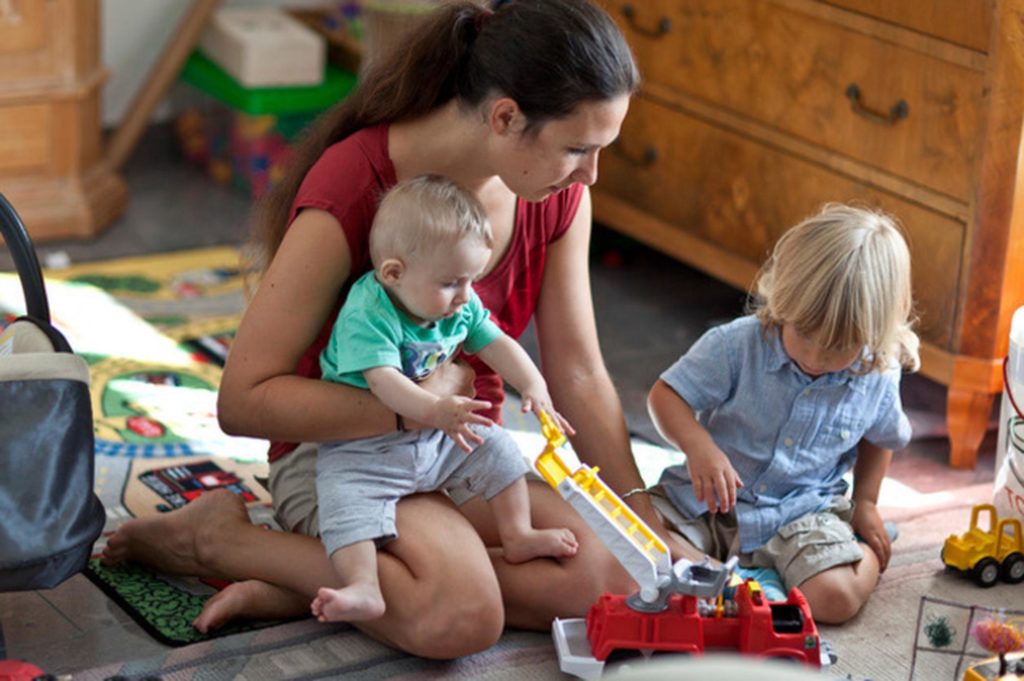Single mothers in the workforce: the struggle for recognition

Credit: Keystone
Single mums make up 85 % of the 2 million single-parent families in France. Victims of a double glass ceiling, they have been invisible for a long time. Now, they are determined to make their voices heard, and to defend their rights.
By Sofiane Zaizoune, Madame Figaro (France)
“We feel as though you’re losing motivation.” These words fell like a ton of bricks on Emmanuelle Hutin, a 41-year-old Parisian and single mother of two children. At the time her manager made this comment, she was working as an executive in a famous luxury company. A few weeks earlier, she had missed a training workshop on leadership, because she’d had to take her severely epileptic son to the hospital. “As soon as something urgent comes up, we’re suspected of being disloyal,” she says.
Yet in France, where single mothers represent 85% of all single-parent families,, there’s nothing exceptional about “something urgent” cropping up. Which is why Ms. Hutin had to say “no” to new projects, trips to Asia, late meetings… Impossible to fit in, when you have the sole charge of the children and need to work evenings and weekends to make the deadlines and ensure you earn the rewards and bonuses that are indispensable to the family’s survival. “Work’s perspective changes. It’s no longer a matter of personal fulfilment,” she explains. “Being a single mum means being up against a double glass ceiling. In order to grow professionally one needs to network, to make oneself visible, to find time to build relations… We’re not equipped for that battle.” She quit her job on good terms in 2018, determined to find her freedom, and this elusive time that she’d missed so much. She was able to devote herself to her son, Solal, who passed away due to illness in 2019, aged 14. Today she’s a freelance artistic director and yoga teacher, and she’s just published a book, La grenade (The Grenade, Editions Stock, March 2021); the story of a family, couple and professional life which, after a breakdown, needs to be rebuilt in a different shape.
A double burden
“Single mothers are still burdened by a huge stigma, as they are presumed to be less ambitious, less available and less invested”, says Jennifer Petriglieri, associate professor in organisational behaviour at the European Institute of Business Administration in Fontainebleau, near Paris. At work, they’re subjected to all that every mother is used to experiencing, but to a greater degree — and silently. Because if they admit to having problems, they say, they risk being cast aside. “Our studies show that the best way to break this taboo in a work environment is to encourage male senior executives to talk about their lives as parents,” she adds.. “If they do, everyone else feels they can do it, too.” Another key issue is flexibility. Whether single or not, any parent sometimes needs to go to the paediatrician in the middle of the afternoon, or to collect their children from school, even if it means working from home afterwards. In some cases, the pandemic has enabled greater flexibility, but only time will tell if this will last. “We need to abandon short-term thinking,” Ms. Petriglieri says. “Two years after a separation, things get easier. But during the transition period, an employer’s support is vital. It’s at that time that women quit their jobs.”
A precarious world
The risk is getting left out of the job market for good. In France, 15% of single mothers are unemployed — more than double the rate of those who are in a couple. For single mums with two children, the rate soars to 33%. Even worse: only 50% of those with a child under-3 have a job, according to the French National Institute of Statistics and Economic Studies. Employed single mothers are twice as likely to have a part-time position than mums who are in a couple. As a result, one third of single-parent families live below the poverty line. Hence the idea, championed by the French association Le Laboratoire de l’Égalité (The Equality Laboratory), that every business should create a solidarity fund for single mother employees. “It would help them to go on holidays or to pay for a babysitter while they participate in training or take driving lessons,” Corinne Hirsch, the association’s vice-president, explains. Another idea, this time upheld by the journalist Nathalie Bourrus, former war correspondent and author of Mères solos, les oubliées de la République (Single Mothers, the Republic’s Forgotten Ones) is to “provide us [single mums] cards like the ones we have for large families, which offer discounts.” Even some higher-earning single mothers would benefit from this, since living standards fall considerably after a separation.
Julie Dénès, author of (Dé)charge mentale (Mental (Un)load, Editions Michalon, 2019) and founder of the publishing house Mindset knows this from experience. At the time, she was a lawyer and employee. “I found myself with €150 Euros [USD 182] in my savings account, having to go without dinner so that my kids could eat three meals a day. Not to mention the permanent stress. My home walls were covered in post-it notes, because the idea of forgetting something terrorised me.”
Divorcealso means moving, often to a smaller home, further from the workplace. Commuting time increases – leaving even less time to work, sleep and live –, causing constant tiredness, aggravated by feelings of guilt of not doing enough, or not doing things well enough. “We feel the need to always be at the top of our game, so that the children have a great time, eat what they like… It’s a lot of pressure,” Ms. Hutin says.. “These women feel they’re the mean parent, the one associated with authority, homework, brushing teeth… And the kids rub it in, saying things like, ‘it’s more fun at dad’s house’,” explains Clémence Prompsy, psychologist and co-founder of the Parisian psychology practice for children Kidz et Family. “It creates a lot of sadness.” How can they, in these circumstances, carve out the time and presence of mind to have a life of their own, and build a career?
Lightening the load
“For both their own good and their children’s, they urgently need to let go and experience feeling carefree again,” Ms. Prompsy says. “Neighbours and fellow parents can be their near-by greatest allies if they take the time to get to know them and become friends. If they’ve got children, parents can breathe while the little ones play.” They create a mutual aid network, taking turns to look after each other’s children. Many organisations already operate on this basis, such as the French association Réseau Môm’artre, which brings together around 15 nurseries and after-school clubs which offer artistic and cultural education-based childcare. It also allows for parents to get to know and support each other, and to meet with sleep specialists and nutritionists. This kind of mutual assistance is all the more important given that the French government has been slow to act. ISingle mothers were among the first Gilets jaunes (Yellow vests); a vast social protest movement that shook France for many months in 2017. Last May, the French National Assembly unanimously adopted a bill put forward by the majority party MP Marie-Pierre Rixain, aiming to guarantee single mothers access to vocational training and priority spots at nurseries. Ms. Rixain also hopes that, in the future, the number of ‘hybrid’ nurseries that combine childcare with professional development support for parents, currently 180, will increase. The passing of this law is a first step. But nothing will change for good unless the parental load is more evenly shared. Ensuring that maintenance payments are met and that fathers take an active role in their children’s education remain the key challenges to make a real difference — for everyone’s benefit.

This article is being published as part of “Towards Equality”, an international and collaborative initiative gathering 15 international news outlets to highlight the challenges and solutions to reach gender equality.




